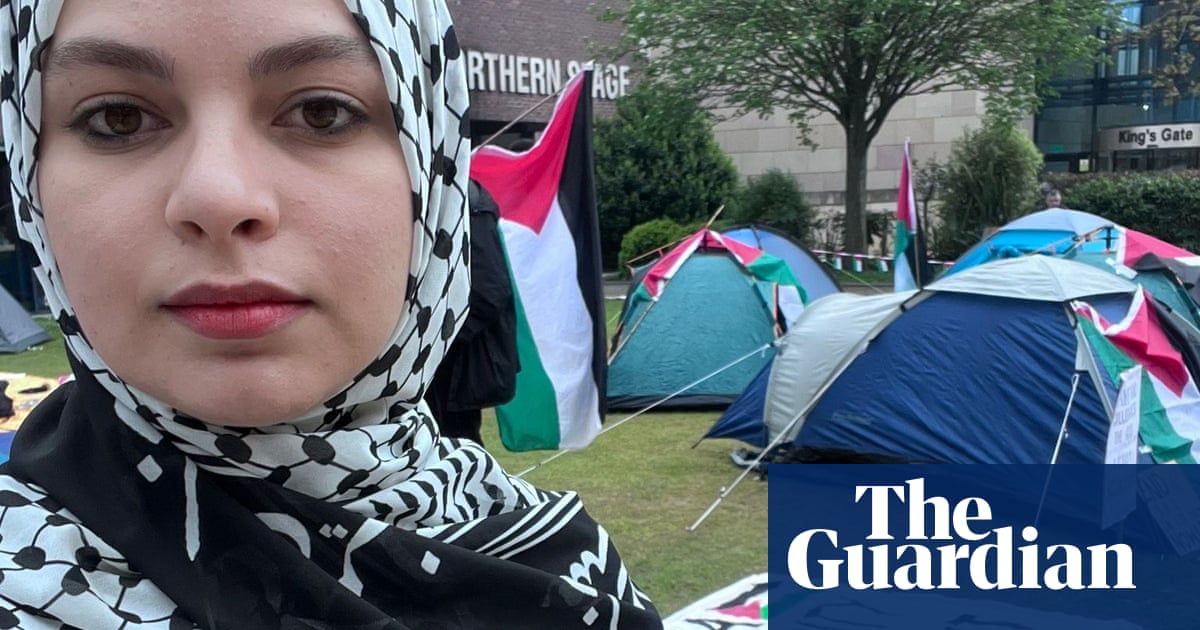


Students across Britain have said they hope pro-Palestine protests will reach the same scale as those seen on US campuses as they call for universities to divest from companies supplying arms to Israel.
Protests have spread across university campuses in Sheffield, Bristol and Leeds, after a crackdown in the US on protests, which led to mass arrests of students and staff.
More than 2,000 people have been arrested on university campuses in the US, garnering attention from international media and people in the besieged Gaza Strip, including Bisan Owda, a Palestinian journalist and content creator living in Gaza, who encouraged student protesters “to do more” for this “unprecedented moment” in a video posted on Instagram.
Samira Ali, 24, is one of about 100 students who stormed the library at Goldsmiths, University of London this week, occupying the first two floors. Ali, a third-year sociology student and co-organiser for Goldsmiths for Palestine, said 30 students had occupied the building, demanding the university ends “financial complicity” and condemns the war in Gaza.
“I think that it’s only right what we’re doing right now as students standing up for Palestine, particularly saying that it’s not acceptable that the universities that we attend – particularly universities like Goldsmiths which rely on international reputation of being a progressive university – to stay silent on what’s going on in Palestine, the massacres, the horrors and also be complicit in investments,” she said.
Although the scale of protests on university campuses in the UK has been relatively small in comparison with the action in the US, students say they remain steadfast and anticipate more planned action.
“I think what we’re witnessing now is almost an international student revolt. We obviously know what’s been happening in the US … There’s a wave of encampments around Britain, which hopefully will grow. I think the potential for them to grow is huge,” Ali added.
A spokesperson for Goldsmiths said it was “in dialogue with students”, who were no longer in occupation by Sunday, and “fully committed” to introducing meaningful support for those affected by the war, including a pledge of £120,000 a year to humanitarian scholarships for Palestinian students.
Hala Hanina, a Palestinian who has been involved in protests at the University of Newcastle, said more than 400 people she knows in Gaza have been killed. Hanina, 31, who came to the UK before October, said: “I don’t have friends now. They have all either been killed or lost their families … I’m doing this for all of Gaza that’s facing a genocide, something that’s unprecedented and unimaginable.
“I must do whatever is possible to be done and even impossible, we’ll make it possible … It’s so important for the student community and British community that they are fighting for justice.”
There has been a renewed focus on the investments of universities since October, with protesters calling for universities to sell off shares, assets or other investments in companies linked to Israel and its war in Gaza, known as divestment.
Student protesters at the University of Warwick said they were willing to juggle exams with protests to ensure their demands are met.
Fraser Amos, a PhD student in global sustainable development, said: “A lot of the main students staying overnight at the encampment, they are in their final year of university. They’ve got exams, there are people in the tents writing their dissertations.
“It’s really difficult and we’re all trying to pitch in to help them out as much as possible. But the fact that they’re making that sacrifice shows how important this is.”
However, the protests on campuses in the UK have been criticised for creating a “hostile and toxic” atmosphere for Jewish students, according to the Union of Jewish Students. Gavriel Solomons, the vice-chair of the Young National Jewish Assembly and politics undergraduate at University of Hertfordshire, said: “The last thing we need is to import an even more aggressive form of organised antisemitism from the US.”
The president of Newcastle University’s Jewish society, Eliana, said Jewish students feel “very isolated compared [with] the numbers which show up to these rallies” and some said, if it weren’t for in-person exams, “they would have finished the semester at home to avoid campus, because it feels safer”.
“The university has a responsibility to protect free speech, but procedures to protect minorities from hate speech leave a lot to desire. At many times, it feels that little is done to prevent hatred or radicalisation from being propagated,” Eliana said.
A spokesperson for Newcastle University said they met “regularly with representatives” from Jewish and Muslim student societies adding: “We are clear that protests should be within the law – we do not tolerate the use of threatening, abusive or insulting words or behaviour that causes, or is likely to cause, distress.”
The university said it did not invest in companies making armaments, adding: “Any proposals for defence and security collaborations are reviewed on a case-by-case basis.”
The University of Warwick has been approached for comment.